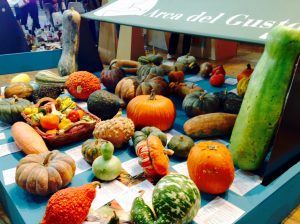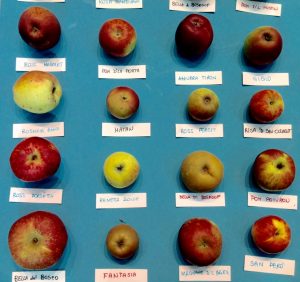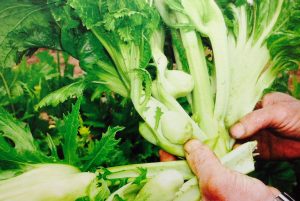
This past week, I attended the international Terra Madre conference of farmers, ranchers, fishers, and other people who bring real food to the table. One of the most impressive displays there was Slow Food’s Ark of Taste.
The “ark” is virtual, but its contents are real. They are varieties of fruits, vegetables, grains, meats, and food-making processes that are in danger of disappearing in our homogenized world. The Ark of Taste brings attention to these foods, and invites everyone to take action to help protect and preserve them. This often means supporting producers of ark products by purchasing the items — such as the Bianca Perla polenta corn pictured above, a heritage breed turkey for your Thanksgiving dinner, or heirloom vegetables from your local farmer. When you do so, you are doing your part to make sure your future generations will have them.

The Ark of Taste at Terra Madre showcased a small subset of the edible biodiversity of our earth, but it was nonetheless a spectalular, beautiful, and mind-expanding exhibit of delicious and nutritious foods in danger of being lost.Biodiversity, short for biological diversity, is one of those wonky words that can make you glaze over. Which is a pity, because biodiversity is crucial not just for the future of our palates, but for the future of our planet.
It is of great importance, especially for agriculture because, in the words of Slow Food founder Carlo Petrini:

“Biodiversity . . . makes living systems flexible, adaptable, and therefore resilient . . . . To cultivate and protect biodiversity means to look after this, our common house, which we do not own title to. Rather we are renters, lessees of a furnished apartment. After so much carelessness, we have just become aware that too many of our things have disappeared. That’s why we take inventory. We ought to know, as of today, what we’re responsible for. Because the next tenants have the right to find the same patrimony.”
Biodiversity is important for we human beings, and for all living things within all ecosystems, for many reasons. Here are just a few:

- Biodiversity allows for ecosystems to adapt to climate change, fire, flood, and other disturbances.
- It provides us with a wide variety of foods, each providing different tastes and nutrients, and each taking and giving different nutrients back to the earth. Within one type of food, potatoes for example, genetic diversity ensures that not all potatoes will succumb to an infestation, and not all will fail in certain climatic conditions.
- Most medical discoveries have been made because of research into plant and animal biology and genetics. Every time a species goes extinct or we lose genetic diversity within a species, we may be losing an important medical advance.
There are many other reasons to embrace biodiversity, especially in agriculture. But for me, the best reason is the simplest: for the pure pleasure of experiencing the infinite variety of life on Earth.


